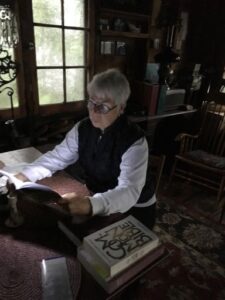I’m persuaded that some people are born to write. No one “becomes” a poet or novelist or journalist: one merely follows the spirit and learns the craft that comes naturally. Some people write successfully in several genres. I marvel at famous writers whose skill embraces novel, memoir, essay, poetry. Whenever I pick up a copy of, say, National Geographic or Smithsonian Magazine, I’m altogether impressed with the research, scholarship, and adventuring spirit that produce this avalanche of intriguing information. At our house, these are coffee table magazines: here today, gone tomorrow. For that matter, every article in the morning papers or weekly news magazines has been produced by a writer putting his or her talent and integrity to work. How casually I toss them in the recycle bin.
So it seems especially ridiculous at this time in my life to realize that I once wanted to be “known” as a serious poet. Known by whom? What for? Well, for one thing, if you’re a writer by calling, you hope to have readers. Finding readers for poetry has always been a bit of a mystery, ever since popular magazines mostly stopped publishing verse. You won’t find a Dorothy Parker or an Ogden Nash, a Phyllis McGinley or a Robert Frost drawing national attention anymore. A few poets today are well-known. Mary Oliver and Billy Collins come to mind. But can you name the current U. S. Poet Laureate?
So when I first began trying to publish my poems back in the 70s, I aimed for a literary audience, with the hope of piling up some credibility, or merely some credits. I discerned that a long list of literary publications was essential in the climb to compile a body of work, perhaps a book, and to gain recognition among peers. Literary journals had a ranking of prestige. So, naturally, I always submitted my poems first to The New Yorker and to Poetry Magazine. I mean, why not? You never know what an editor will do. Rejection piled upon rejection.
Eventually, I found a kind of niche with my poems appearing in so-called little magazines where the poets—who were also the main readers and subscribers—were people I thought I’d like to be friends with. Indeed, I did become friends with many, most marvelously with Gail White, a Louisiana poet who has by now been my friend for more than forty years, thanks to our meeting up in the pages of The Lyric.
Most of my education as a poet came through books. No university had yet invented an MFA (Master of Fine Arts) degree in “creative writing.” I was on my own and adopted my own teachers, some of whom I met in person at workshops and conferences. Gradually, I came to balance with my abilities and aspirations.
I have long since realized that the poems I made through the years were not so much about the audience out there as the audience within: my spirit speaking to the deepest values and beliefs of my own self, and bringing out the words. That body of work reaching back to my 20s reveals things I knew before I knew that I knew them. The poems, published or not, are the philosophical journal of my life. Turns out that’s all the reason I need for having written them. (But publication is still very satisfying.)
There are thousands of poets out there, writing in thousands of voices. I read poems every day.
My favorite feeds (you can find your own way to the URLs):
Garrison Keillor’s Writers’ Almanac
Ted Kooser’s American Life in Poetry
Enjoyable online literary magazines:
LightPoetryMagazine.com
Better Than Starbucks

So…dip in. Poetry needs readers like you.
P. S. Early on, I aimed to be a “serious” poet—or at least to be taken seriously. It was tough enough being a professional writer for Hallmark, that notorious vendor of lugubrious sentiment. Happily for me, I fell into the coterie of serious poets who realize that it takes brute cleverness to write humorous, light, and lively verse. So-called light verse can serve up profound insight. Who knew?
Pictured: Serious poet at work in the early morning hours at the cottage. Not exactly by candlelight, but close.






I’ll bet you waited to see if I would read this unprompted and find myself — and I did (insert winking emoji here). So thank you! This is a beautiful approach to our unprofitable trade.
I also admire the way you have made the originally Spartan cottage look like a cozy Victorian parlor.
Well Barbara, as I have come to the decision of seriously focusing on writing, I was lured to your blog and you’ve caught me resonating when I read. Oliver is my favorite poet. I often am pursuaded to avoid following rules, guidelines and the path of others as I spend time writing my own savory poetry at any given moment. Encouraging words come to me at the absolute best moments as I stagger into conversations about how and why I should write my poetry and short pieces of unique literature. I savored every word in this blog and encourage you to write more, selfishly, for my own pleasure and inspiration. I love words passionately. Including my own. Thanks for being you!
U.S. poet laureate: Joy Harjo. Did I have to look it up? Yup. But she was named just in June, so that’s my excuse.